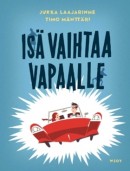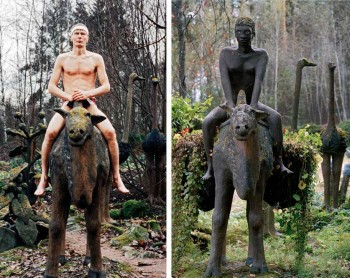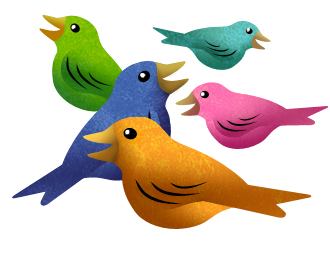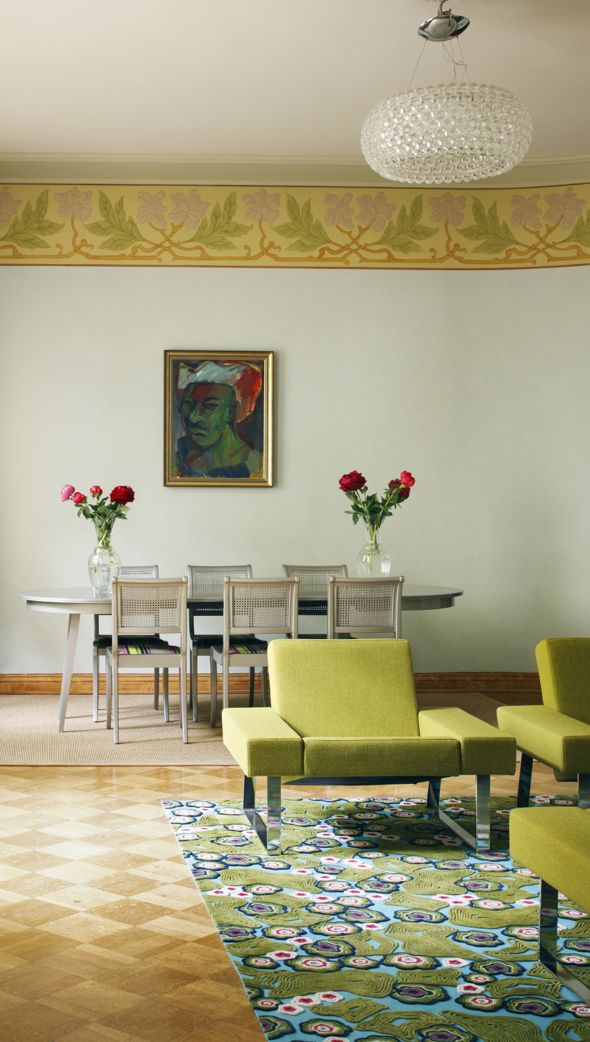Search results for "2011/04/2010/05/song-without-words"
Jukka Laajarinne & Timo Mänttäri: Isä vaihtaa vapaalle [Dad takes time off]
9 January 2014 | Mini reviews, Reviews
 Isä vaihtaa vapaalle
Isä vaihtaa vapaalle
[Dad takes time off]
Kuvitus [Ill. by]: Timo Mänttäri
Helsinki: WSOY, 2013. 31 pp., ill.
ISBN 978-951-0-39780-0
€26.90, hardback
Isä vaihtaa vapaalle is a picture book infused with wry humour which lends itself to both realistic and fanciful readings. In the story, a girl’s father is a secret agent. He’d like to reduce his working hours to spend more time with his daughter, but his employer has other ideas. This book provides an amusing reflection of its time: parents’ job titles often do not mean much to children, so their strange roles and the heavy briefcases parents lug home start to take on a life of their own in children’s minds. The story is free from clichés about gender roles and will entertain boys and girls alike. Timo Mänttäri, making his debut as a children’s book illustrator here, depicts fast-paced, dangerous situations and amusing details. The comic book-style narrative and large, double-page illustrations create suspense in this zippy story. The words and pictures are seamlessly integrated, and the not-overlong text is balanced by the exceptionally strong, expressive visuals.
Translated by Ruth Urbom
As in a dream
31 December 1992 | Archives online, Fiction, Prose
From Kun on tunteet (‘When you have feelings’, 1913). Introduction by Irmeli Niemi
‘No, they’re not rich, those Kolehmainens, not rich at all. Even the house is a bit on the small side.’
‘So how did you end up there? That’s one thing I’ve often wondered about.’
‘How did I end up there? Well, it must have been my fate.’
‘You sure weren’t looking to get rich.’
‘No, I sure wasn’t. Got married when I had to.’
‘Had to. You can’t tell me it had to be to him. You, with suitors in every size and shape. All you had to do was pick out the best, but no, you just up and take off with somebody from out of town, and a poor man at that.’ More…
Solitude growing
30 June 1995 | Archives online, Fiction, Prose
Extract from Häiriö maisemassa (‘A disturbance in the landscape’, Otava, 1994). In this, her first novel, Raija Siekkinen – well-known for the fragile prose fof her short stories – continues her dissection of the soul with an account of the experience of a womanwho finds that many lives are being lived through her own
She was pregnant. After all these years, the woman finally found she was pregnant: it was as if the man had made a last attack to retain his hold on a country he had once conquered.
She let the days go by, the days of autumn, which night by night edged more shadow across the damp lawn. She looked at the man from a distance, not seeing him; her mind rehearsed what she knew about him. The man had two children from a previous marriage. The woman had not wanted the children to come here, and neither did their mother; that was, indeed, the only subject on which they agreed. The man went to visit his children; they never spoke about what happened on those occasions. More…
Self-made man
1 April 2009 | Extracts, Non-fiction

On camelback: in the exotic part of Veijo Rönkkönen’s concrete cosmos there are animals and palm trees, side by side with the living plants of the northerly latitudes. - Photo, left: Veijo Rönkkönen; right: Veli Granö.
Extracts and photographs from Veijo Rönkkösen todellinen elämä / The real life of Veijo Rönkkönen (Maahenki, 2007. Translation: Kirsti Nurmela-Knox)
Veijo Rönkkönen (born 1944) has lived all his life on an isolated, small farm in eastern Finland, Parikkala, less than a kilometre from the Russian border, where he has quietly built a garden inhabited by nearly five hundred human figures made of concrete. Entrance is free.
What have brains got to do with it?
17 October 2013 | Columns, Tales of a journalist

Illustration: Joonas Väänänen
Pondering his changing profession once again, columnist and media critic Jyrki Lehtola feels compelled to present a brief history of the media
Not long ago a certain media company invited me to participate in a panel on brainprints.
I didn’t know what they were talking about, so I agreed. At most I thought it was about the engram left in our collective psyche that yes, we used to have this sort of print media thing that told us what the world was like.
And then we didn’t – look at this picture of print media on my iPad, kids, isn’t it cute?
That wasn’t what it was about at all. Brainprint means all the ways the media can influence us as consumers. In other words, this is one more conversation the media has with itself to convince itself that it has a role to play.
There we sat around a long table once again talking about whether the media is a mirror or a window when maybe we should have been talking about the pile of glass on the ground and whether someone shouldn’t clean it up before someone hurts themselves. More…
Living inside language
23 February 2010 | Essays, Non-fiction
Jyrki Kiiskinen sets out on a journey through seven collections of poetry that appeared in 2009. Exploring history, verbal imagery and the limits of language, these poems speak – ironically or in earnest – about landscapes, love and metamorphoses
The landscape of words is in constant motion, like a runner speeding through a sweep of countryside or an eye scaling the hills of Andalucia.
The proportions of the panorama start to shift so that sharp-edged leaves suddenly form small lakeside scenes; a harbour dissolves into a sheet of white paper or another era entirely. Holes and different layers of events begin to appear in the poems. Within each image, another image is already taking shape; sensory experiences develop into concepts, and the text progresses in a series of metamorphoses. More…
Truth or hype: good books or bad reviews?
8 November 2013 | Letter from the Editors

‘The Bibliophile’s Desk’: L. Block (1848–1901). Wikipedia
More and more new Finnish fiction is seeing the light of day. Does quantity equal quality?
Fewer and fewer critical evaluations of those fiction books are published in the traditional print media. Is criticism needed any more?
At the Helsinki Book Fair in late October the latest issue of the weekly magazine Suomen Kuvalehti was removed from the stand of its publisher, Otavamedia, by the chief executive officer of Otava Publishing Company Ltd. Both belong to the same Otava Group.
The cover featured a drawing of a book in the form of a toilet roll, referring to an article entitled ‘The ailing novel’, by Riitta Kylänpää, in which new Finnish fiction and literary life were discussed, with a critical tone at places. CEO Pasi Vainio said he made the decision out of respect for the work of Finnish authors.
His action was consequently assessed by the author Elina Hirvonen who, in her column in the Helsingin Sanomat newspaper, criticised the decision. ‘The attempt to conceal the article was incomprehensible. Authors are not children. The Finnish novel is not doing so badly that it collapses if somebody criticises it. Even a rambling reflection is better for literature than the same old articles about the same old writers’ personal lives.’ More…
Alone here
31 March 1989 | Archives online, Fiction, poetry
Gösta Ågren has published a couple of dozen volumes of poetry; Jär (the title is a dialect word meaning ‘here’) won the Finlandia Prize in 1989. Ågren’s earlier poems have been epic, tinged with Marxism, in the style of Whitman and Neruda. Gradually his has become more strongly linguistically concentrated, developed towards a more conventionally lyrical style questioning the problem of existence. He himself has expressed the matter in one of the paradoxical statements he particularly enjoys: ‘don’t worry / it will never work out.’ Introduction by Erkka Lehtola
Here
Here she came, through the motion
less Sunday of old age.
In headscarf and long skirt
she came, a tall bird
of clothes. She wondered in
the sunlight on the shed-hill
what she should do
so she could die. I must
write about this. For it happens
everywhere, and there are no
questions to answer. But questioning
is already insight. Only
those questions that are never asked
need answers. I remember
that her hands were no longer
part of her. Idle
they lay in her lap. She saw
with her eyes only darkness
and light. It was silent. I
thought: the silence is creeping
through her body. Soon
it will reach her heart. Soon
I will be alone
here. More…
The private I? Me and my home
17 June 2014 | Reviews

Art Nouveau with a modern twist. Photo: Avaimia ajattomiin suomalaisiin sisustuksiin / Jaanis Kerkis
Avaimia ajattomiin suomalaisiin sisustuksiin
[Keys to timeless Finnish interiors]
Design: Hanni Koroma, text: Sami Sykkö, photographs: Jaanis Kerkis
Helsinki: Gummerus, 2014. 123 pp., ill.
ISBN 978-951-20-9507-0
€32.90, hardback
Katja Lindroos
MOMO. Koti elementissään
[MOMO. The home in its element]
Photography: Riikka Kantinkoski, Niclas Warius
Helsinki: Siltala, 2013. 154 pp., ill.
ISBN 978-952-234-164-8
€32.90, hardback
www.momokoti.fi (in Finnish only)
‘Interior decoration’ has become an extremely popular pastime in Finland – as elsewhere where the standard of living allows it.
Innumerable magazines and blogs keep churning out photos of rooms with large white, cushioned sofas, glossy white kitchen cabinets and white floors on which furniture seems to float forlornly. Walls are decorated with wooden or metallic letters forming words: love; home, sweet home. In the kitchen the bread bin bears the word BREAD. (Bookcases, with actual books, are rare.)
Why is it that in our age which worships ‘individuality’, trends rule? More…
The tower
31 December 1987 | Archives online, Fiction, Prose
A short story from the collection Torni (‘The tower’, 1987). Introduction by Erkka Lehtola
The dog came through the door first, a big, long-haired brute. He hadn’t said anything about it on the phone, but from the look on his face you could tell it was his and that he meant to take it with him into the forest.
He shuffled across the yard with his rubber boots on and a rucksack on his back. In one hand he held a camera tripod.
I rolled down the window.
‘Wait a minute,’ he said.
He walked behind the cars standing in the parking lot, over to his own car and opened the trunk. The dog twisted around his legs whining softly. He took something out and slammed the trunk shut. More…
A slow passion
30 September 2007 | Fiction, Prose
A short story from the collection of short stories Hidas intohimo (‘A slow passion’, Gummerus, 2007)
I don’t want to interfere with it. If something comes of it, then something comes of it. You can’t interfere with time, or fate, or another person. Time ripens things on its own. Fate takes a longer view of things than people do. Like the prophet says, there is a time for every purpose, for my purposes and other people’s.
This garden cottage is a good place to watch everything quietly, a ringside seat for someone who doesn’t want to flail around getting smashed up. The potatoes bloom when it’s time for them to bloom, depending on the length of the summer, the weather, and the time they were planted. Their white and purple flowers are worthy of admiration– potato flowers are flowers, after all. But when the flowers are just opening, it’s not yet time to go digging around among the roots. You have to restrain yourself and wait until the tubers form. You have to wait until they’re finished blooming and the flowers are replaced by plumping green, poisonous berries – though not all potato varieties produce them. But if your fingers are really itching for them, you can poke into the dirt and grope around a little before it’s really time, feel for tubers and remove them carefully, patiently, leaving the plant undisturbed for the smaller ones to grow. If the groping turns up something, you can slip away and savour it, but you still have to wait before you can dig up the whole plant with its rootstock, its beautiful pure tubers heaved up onto the soil, as if Life were offering itself on a silver salver. Then you can have them. They’re ready. But it takes time. Many good things are destroyed by impatience. More…


